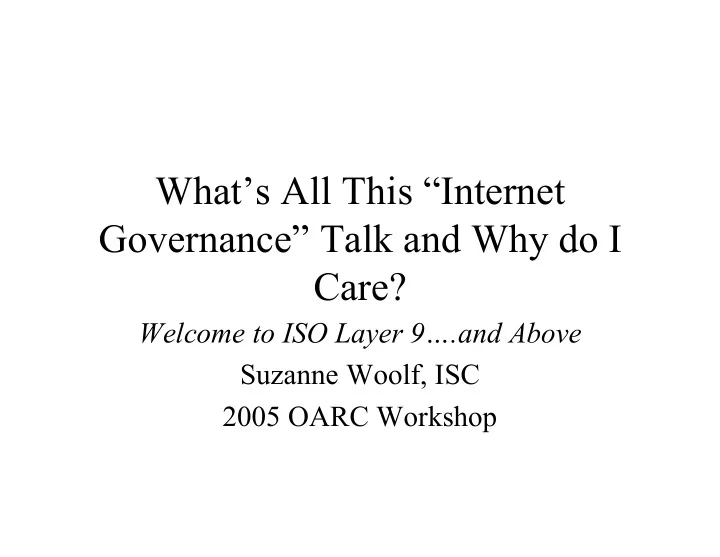

What’s All This “Internet Governance” Talk and Why do I Care? Welcome to ISO Layer 9….and Above Suzanne Woolf, ISC 2005 OARC Workshop
Quick Overview: Motivation • Motivating Question: What’s public policy work got to do with operating critical “DNS Infrastructure”? • I don’t despise politicians (“ Politics is what we do instead of hitting each other over the head with rocks .”) • I am an engineer, which means I’m motivated to make things work. I want there to keep being an Internet for engineers and politicians to keep having arguments on.
Alphabet Soup: ICANN • ICANN/IANA: Internet Corporation for Assigned Names and Numbers/Internet Assigned Numbers Authority • Exists to: – Be the point of contact for the DNS root zone; – promote competition among non-ISO 3166 TLDs; – Manage the assignment of unique protocol parameters: IPv4, IPv6, ASN, DNS RR, TCP options…. • Exists because: – US company, MoU with US Government; – Contracts with registrars and registries
Alphabet, 2: US DoC • US DoC: United States government, Department of Commerce • Exists (in this space) to: support the transition of ICANN’s functions from USG funding to an open, global, participatory public-private partnership • Exists (in this space) because: – History: significant technology funded by US R&D – MoUs with ICANN – Contract with VeriSign for root zone provision – Diplomatic relations with other governments
Alphabet Soup, 3: UN/ITU • UN/ITU: United Nations and its agency, International Telecommunications Union • Exists (by treaty) to: mediate among countries regarding global concerns, including operational and economic aspects of telecom infrastructure • Exists (in this space) because: Members said, “We depend on the Internet. Go find out how we can influence what happens to it.” • Fundamental assumptions: – Governments represent people – UN/ITU represents governments
What Happened? • The Internet has become critical infrastructure for the planet: economic, political, social • Making it work now cuts across many public policy areas: stability of infrastructure, investment priorities, access for developing countries, intellectual property, human rights. • It is not now and have never been run the way other critical infrastructures are, like…. say…. traditional telecommunications.
How do we fit in? • We have our hands on the knobs. – We know what works. – We know how things break. – We know how to change it. • The politicians don’t. – They’re being held responsible anyway. – They’re scared.
2005 as Inflection Point • ICANN has had seven years to figure out its job and start doing it credibly. • US DoC MoU expires 9/06, with the stated goal of giving ICANN sole oversight of the contents of the DNS root zone at that time. DoC has said that won’t happen, sort of. • UN convened World Summit on the Information Society (WSIS, 11/04) then Working Group on Internet Governance (WGIG, 11/04-7/05) to consult on the role of governments and intergovernmental agencies in “IG”.
So what do they want from us? • Scared politicians start convening task forces and making laws. We can’t stop that. • “Trust us” doesn’t work anymore. • But: – Education can work. – Showing up helps. • Perception is reality. (more on that later.)
Some myths slain • All .com or .jp or .de domains are “in the root” and require US government approval • All Internet traffic touches the DNS root servers. We know what websites you visit. • It’s possible to block traffic you don’t like by URL, port, protocol…. (partially slain, anyway….)
WGIG on DNS root servers • Report issued 18/7/05: www.wgig.org • Initial drafts: assumption that DNS root server operators were a group of American weekend volunteers who needed to have some order, accountability, and diversity imposed on them • Final draft: reiterates the stability record of the system to date, recognizes the broad diversity of anycast, and gently suggests more formal recognition of the current, trusted system.
They still need us to tell them: • “What’s so bad about alternate roots?” • Spam and malware – These are social problems, not just technical – Governments must cooperate with each other • Internationalized Domain Names (IDN): side effects of one solution can cripple another • IP addresses: competing country-based registries could destroy the routing system
Recommend
More recommend